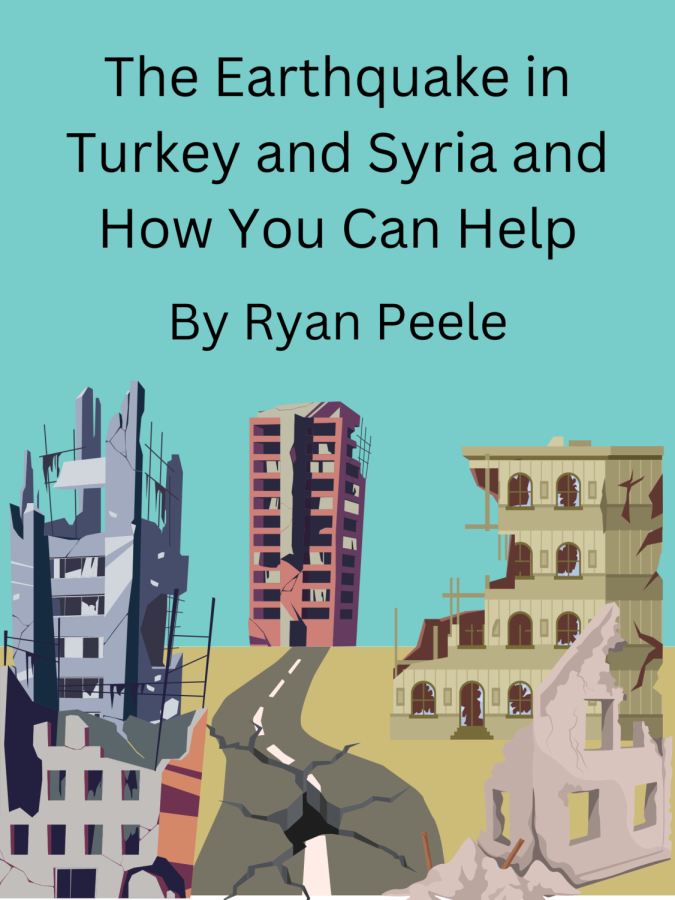The Earthquake in Turkey and Syria and How You Can Help
March 21, 2023
On Feb. 6th, a devastating, 7.8 magnitude earthquake struck both Southern Turkey and Northern Syria, followed soon after by a 7.7 magnitude aftershock. The earthquake and its aftershocks have killed more than 55,000 people, making it the deadliest earthquake in the world in the last 13 years, and the deadliest earthquake in both countries in centuries.
The earthquake also occurred at a very contentious time and place in the world of geopolitics. The seismic disaster devastated the border between Turkey and Syria, an area lined with refugee camps for Syrian civilians fleeing the Syrian Civil War. The deadly, decades-long conflict between autocratic, democratic, and Islamic extremist groups has killed over 600,000 Syrians and has displaced more than half the country’s population, according to Reuters. As a result, the Syrian refugees who survived the earthquake are scrambling to flee to Turkey in the chaos, hoping to find a better life there or in Europe, reinvigorating a new wave of discontent amongst the Turkish people, especially against their president and accused dictator, Recep Tayyip Erdogan, for his failure to better plan for and respond to the crisis.
Many have accused Erdogan’s government of being too corrupt to effectively aid the Turkish people suffering from the earthquake.
“The funds created for earthquake preparedness have been used for projects such as road constructions, infrastructure build-ups, etc. other than earthquake preparedness… No buffers or cushions have been set in place to limit the economic impacts of such disasters,” said Arda Tunca, an Istanbul-based economist, according to CNN, “The magnitude of Turkey’s social earthquake is much greater than that of the tectonic one… It seems that the winner [of the upcoming presidential election] is going to be unknown until the very end of the elections.”
While the earthquake has undoubtedly caused chaos, both physically and politically, there are things that we as people from the United States, even from Loudoun County, can do to help the hundreds of thousands of innocent people suffering in Turkey and Syria.
“Groups in America can help by donating money to reputable organizations in the Middle East. Most of the groups in Turkey and Syria help by searching for victims in rubble, assisting people who have lost homes, and providing first aid when needed,” said Ali Kesserwani, President of the Middle Eastern Student Association at University of Alabama at Birmingham, “We in the US can do two things. The first is to spread the word of what’s going on to bring awareness. The second is to donate to charitable organizations that offer first aid and assistance.”
Efforts to save lives in Turkey and Syria have been grassroots, yet global at the same time, with Mariella Daood, President of the Syrian Students’ Association at University of Toronto at Mississauga, stating that her organization has “planned both clothes and money fundraisers to send back to people in Syria.” Daood promoted donating to larger, global charities, saying that the Syrian Students’ Association has been “sending everything through [the] Red Cross, [which has been] very helpful.”
Across the world, millions of people have been working to help the people in Turkey and Syria whose lives have been destroyed by the earthquake. They don’t have to work for the UN, who has allocated millions of dollars in aid, or the Red Cross, who has been sending thousands of staff and distributing hundreds of millions of meals to those starving in the region. Instead, ordinary people, even halfway across the world, in Loudoun County, can make a world of a difference just by investing some time and money to help those desperately in need.


